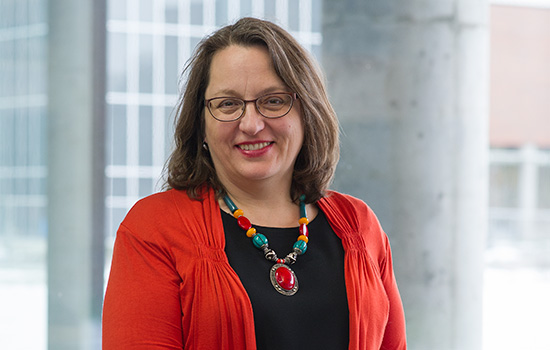Tiger Talk: Doreen Edwards
A. Sue Weisler
Doreen Edwards is the new dean of the Kate Gleason College of Engineering.
Doreen Edwards became dean of the Kate Gleason College of Engineering in July. She had been dean of the Kazuo Inamori School of Engineering at Alfred University and acting vice president of Statutory Affairs for the university. She is the first female dean of RIT’s engineering college, which is the only one in the United States that is named after a woman. Here she talks about her background and plans for the college.
I was in third grade and the teacher was teaching us about atoms and she pointed at the table and she said, ‘You know, there are atoms in that table and they are moving all the time.’ I looked at the solid table and this notion that it was constructed of something that was moving all the time just locked me in.
I got my undergraduate degree at South Dakota School of Mines and Technology, which is predominately an engineering school. My undergraduate degree was in chemistry.
I moved to Chicago and I worked for Gould Research Center in microelectronic processing for a couple of years. From there I moved to Northwestern University. At that point they had a contract research lab that was called BIRL, which stood for Basic Industry Research Lab, and their whole premise was that they would write proposals to companies to solve problems.
I worked there for six years and went back to grad school part time for a good many of those six and then at some point decided I was never going to get a Ph.D. part time, so I quit and went back to graduate school full time.
In order to advance in research, you needed to have a Ph.D. I can remember a few occasions of writing proposals and having my name scratched off and the Ph.D.’s name put in as the author because they knew they needed that to get it funded or to move forward.
I moved to Alfred, N.Y., and started as an assistant professor at Alfred University in 1997.
I got tenure and right after I got tenure I became graduate program director, and that morphed into an associate dean position. In 2009, I applied for the dean’s position and was dean until I started here.
I was familiar with RIT and had visited it periodically when I was at Alfred. When I interviewed here I was just absolutely blown away by the transformation.
I was impressed with RIT’s strategic plan, particularly in the area of interdisciplinary research and interdisciplinary studies, and that was one of the things that attracted me to RIT.
One of our plans for the college is that we want to grow research and we want to do so in a way that engages students at all levels—undergraduate, master’s, Ph.D. That is one of the areas we are very interested in.
We have made tremendous strides in the percentage of female engineers and certainly we would like to continue to grow that trend toward the overall population. One area that we have a lot of work to do is increasing the percentage of AALANA students—African American, Latin American, Native American. We can leverage some of the programs that we used for women in engineering to under-represented minorities, so that is one of our major goals.
A personal goal is reconnecting with alumni. I want to hear about their experiences, what RIT did for them in a positive way and where there is room for improvement. How can RIT better serve future students?
I absolutely love it here. I’m really impressed with the dedication the faculty has to student development and student education.
I’m very impressed with the enthusiasm and engagement the students have with their studies.
I would like to be remembered as a dean who was instrumental in increasing research in the college in a way that preserved the student-centered values that we have.
Education
Doreen Edwards holds a Bachelor of Science degree in chemistry from the South Dakota School of Mines and Technology and a Ph.D. in materials science and engineering from Northwestern University.
Work experience
Prior to attending graduate school, Edwards worked as a research scientist at BIRL, a contract research lab at Northwestern University, and at the Gould Research Center in Chicago.
Awards
Edwards joined Alfred University in 1997 as an assistant professor of materials science and received numerous faculty awards there. She also received the Chancellor’s Award for Excellence in Teaching, one of the State University of New York’s highest honors. In 2001, she received a CAREER Award from the National Science Foundation.
Research
She has served as the principal investigator on fundamental and applied research projects, focusing on oxide materials for fuel cells, batteries, thermoelectric devices, environmental remediation and solar energy applications.














